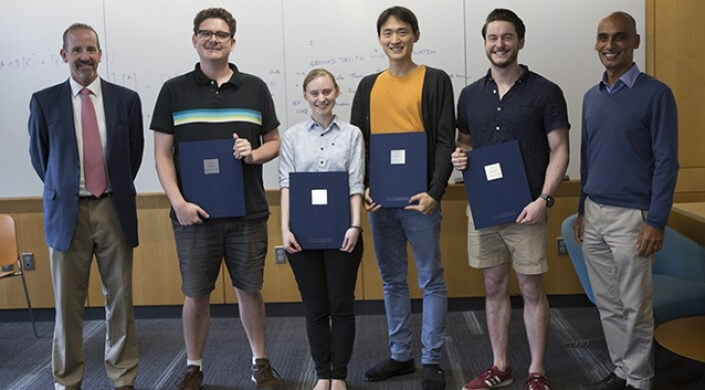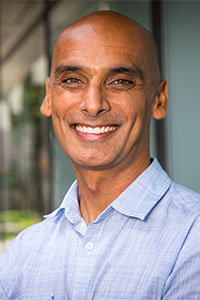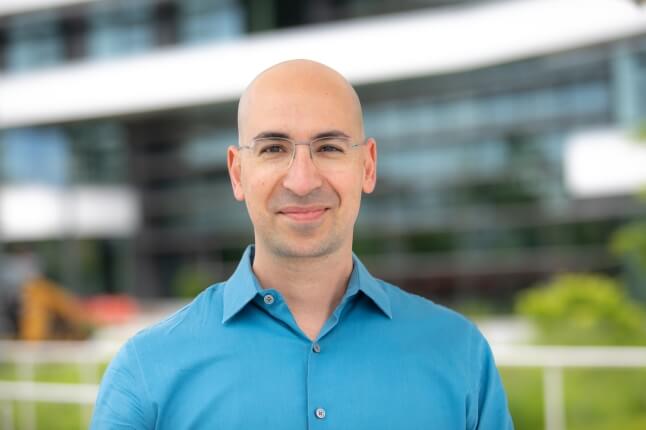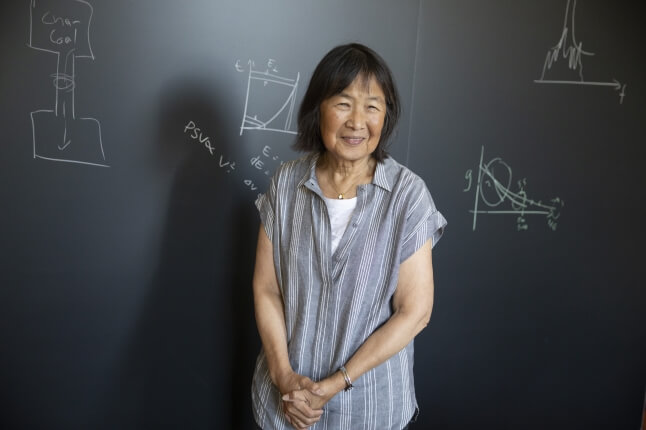News
(From left) Dean Frank Doyle, Siebel Scholars Bradley McDanel, Emma Alexander, Nam Wook Kim, and Robert Bowden, and Area Co-Chair for Computer Science Salil Vadhan, Vicky Joseph Professor of Computer Science and Applied Mathematics, at a reception honoring the scholars. (Photo by Adam Zewe/SEAS Communications)
Five computer science graduate students at the Harvard John A. Paulson School of Engineering and Applied Sciences (SEAS) have been named 2019 Siebel Scholars.
Emma Alexander, Jaroslaw Blasiok, Robert Bowden, Nam Wook Kim, and Bradley McDanel will each receive a $35,000 award for their final year of graduate studies.
They are among 96 students who join past Siebel Scholars classes to form a professional and personal network of more than 1,300 scholars, researchers, and entrepreneurs. Through the program, this group brings together diverse perspectives from business, science, and engineering to influence the technologies, policies, and economic and social decisions that shape the future.
“Every year, the Siebel Scholars continue to astound me with their commitment to academics, research, and influencing our collective future. This year’s class is exceptional, and once again represents the best and brightest from around the world,” said Thomas M. Siebel, Chairman of the Siebel Scholars Foundation. “It is my great pleasure to welcome these men and women into this ever-growing, lifelong community, and I personally look forward to seeing their impact and contributions unfold.”
Established in 2000 by the Thomas and Stacey Siebel Foundation, the Siebel Scholars program awards grants to 16 universities in the United States, China, France, Italy, and Japan. Following a competitive review process by the deans of their respective schools on the basis of outstanding academic achievement and demonstrated leadership, the top graduate students from 27 partner programs are selected each year. On average, Siebel Scholars rank in the top 5 percent of their class, many within the top 1 percent.
Student Biographies
Emma Alexander is a computer science Ph.D. candidate advised by Todd Zickler, William and Ami Kuan Danoff Professor of Electrical Engineering and Computer Science. She is interested in computationally efficient sensing, drawing inspiration from task-specific cameras in both biology and computational photography. In her Ph.D. research, she has developed a computationally efficient depth perception method based on differential changes in image defocus. Alexander received her bachelor’s degree in physics and computer science, both with distinction, from Yale University, where she studied human color perception with Steven Zucker, David & Lucile Packard Professor of Computer Science & Biomedical Engineering. She was awarded an NSF Graduate Student Research Fellowship in 2014, and was honored for presenting the Best Student Paper at the European Conference on Computer Vision in 2016, and the Best Demo at the International Conference on Computational Photography in 2018.
Jaroslaw Blasiok is a computer science Ph.D. candidate, advised by Jelani Nelson, John L. Loeb Associate Professor of Engineering and Applied Sciences. He obtained his master’s degree from the University of Warsaw, where he worked on structural graph theory and fixed parameter tractable graph algorithms. His current research interests are connected by applications of high dimensional probability across various areas of theoretical computer science. The core of his research is designing and analyzing streaming algorithms. For his work on a classical "distinct elements problem,'' he earned the Best Student Paper award at the 2018 Symposium on Discrete Algorithms. In addition to streaming algorithms, he works on coding theory, differential privacy, and algorithms related to machine learning (dimensionality reduction and dictionary learning).
Robert Bowden is a computer science Ph.D. candidate, advised by Margo Seltzer, Associate in Computer Science, and Stuart Shieber, James O. Welch, Jr. and Virginia B. Welch Professor of Computer Science. He has taken on various leadership roles in the Harvard course, Introduction to Computer Science (CS50), since 2010, including being part of a small team that developed the course’s offering through edX in the online platform’s first year. His research focuses on combining techniques from machine learning and programming languages to offer targeted feedback to students on bugs in introductory programming submissions—particularly valuable for online students for whom office hours may not be available. This work began at Microsoft Research as a collaboration with Rishabh Singh. Prior to this, Bowden researched ways to improve specific bottlenecks in VMware’s infrastructure for maintaining snapshots of virtual machines. In the upcoming year, he will serve as one of the two Computing Research Association Education (CRA-E) Fellows, focusing on improving the breadth and diversity of the pipeline of undergraduate researchers flowing into graduate schools.
Nam Wook Kim is a Ph.D. candidate in computer science, advised by Hanspeter Pfister, An Wang Professor of Computer Science, and Krzysztof Gajos, Gordon McKay Professor of Computer Science. His research lies in human-computer interaction and information visualization, focusing on making complex data accessible to the public. He develops interactive tools that support authoring of data-driven stories, as well as visual interfaces for analyzing and communicating data in various domains. He taught a winter course about data visualization as part of the Harvard Graduate Student Council, mentored students on research projects, and served as a teaching fellow for Harvard's courses on visualization and design of useful interactive systems. Prior to Harvard, Nam was a research associate at the Korea Advanced Institute of Science and Technology and also spent several years working for Samsung and LG as a research engineer. He received a master’s degree in computer science from Stanford University and a bachelor’s degree computer science and mathematics from the State University of New York at Stony Brook.
Bradley McDanel is a computer science Ph.D. candidate, advised by H.T. Kung, William H. Gates Professor of Computer Science and Electrical Engineering. His research focuses on designing novel deep learning architectures that are amenable to efficient hardware designs. He has recently worked on designing systolic array architectures for sparse convolutional neural networks. McDanel received a certificate of distinction in teaching for his work as a teaching fellow for Networks Design Projects (CS 144r and CS 244r). In this role, he mentored groups of undergraduates on their research projects and presentations. He has interned at Intel three times, where he has applied machine learning algorithms to a variety of problems, from improving video encoder quality to detecting common characteristics of failing multiprocessors. He led a team on a new defect analysis technology, which has since been deployed into the manufacturing process. McDanel received his bachelor’s and master’s degrees in computer science from Wake Forest University.
About Siebel Scholars
The Siebel Scholars program was founded in 2000 by the Siebel Foundation to recognize the most talented students at the world’s leading graduate schools of business, computer science, bioengineering, and energy science. These include: Carnegie Mellon University; École Polytechnique; Harvard University; Johns Hopkins University; Massachusetts Institute of Technology; Northwestern University; Politecnico di Torino; Princeton University; Stanford University; Tsinghua University; University of California, Berkeley; University of California, San Diego; University of Chicago; University of Illinois at Urbana-Champaign; University of Pennsylvania; and University of Tokyo. Today, the active community of over 1,300 leaders serves as advisors to the Siebel Foundation and works collaboratively to find solutions to society’s most pressing problems.
To date, Siebel Scholars have driven innovations in over a dozen industries, launched more than 1,100 products, authored more than 370 patents, published nearly 40 books and more than 2,650 articles or book chapters, and managed more than $2.7 trillion in assets. As leaders of some of today’s most preeminent start-ups, nonprofits, and research institutions, Siebel Scholars have served on more than 340 boards, established more than 50 philanthropic initiatives, and founded more than 150 companies—of which more than 56 have successfully gone public or were sold to enterprises including Google, Intuit, Match.com, and Dropbox.
About the Siebel Foundation
The Thomas and Stacey Siebel Foundation, a nonprofit, public benefit corporation, was established as a private foundation in 1996. Its mission is to foster programs and organizations that improve the quality of life, environment, and education of its community members. The Siebel Foundation funds projects to support the homeless and underprivileged, education and research, public health, and alternative energy solutions.
Jaroslaw Blasiok
Topics: Awards
Cutting-edge science delivered direct to your inbox.
Join the Harvard SEAS mailing list.
Scientist Profiles
Salil P. Vadhan
Vicky Joseph Professor of Computer Science and Applied Mathematics
Press Contact
Adam Zewe | 617-496-5878 | azewe@seas.harvard.edu




